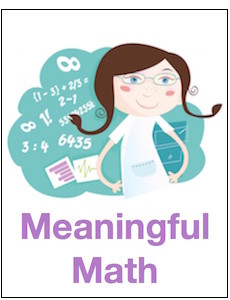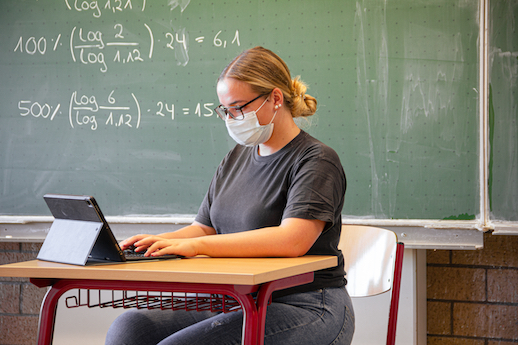Student Survey Says: “Please Listen to Us”
A MiddleWeb Blog

But 2021 is so different from any other year, I realized I needed to take some time to reassess my teaching and figure out – F2F and virtual – what worked the first semester and what didn’t.
I also wanted to check in with my students and see how they were faring in regards to stress and emotional health.
So the first day back I created a survey for my students. I wanted them to share their suggestions, especially for improving on-line learning, and most of all – to give me some insight into their well-being.
I was surprised by their answers, and I will definitely change some things going forward as a result.
How to Organize Online Learning So It Makes Sense
A big stumbling block for my students this year is having to navigate their courses in Canvas (the on-line learning platform our district uses). Students have so many different teachers who all have their own way of doing things, and it can be overwhelming for even high school kids.
So it’s important to me that I organize Canvas in a way that makes sense to my students and doesn’t make it more difficult for them to complete their assignments.
The best way I have found to improve in that area is to get my students’ input and suggestions. I’ve learned they have good ideas. No matter how much I think or plan about something, my students can usually think of a way to improve it. Here were their suggestions:
► Only have assignments and information for the current nine weeks visible.
► Put the most recent assignments at the top.
► Adjust the settings in the shared calendar so students can check off when they have completed an assignment. (I didn’t know you could do that. I’m going to have to get some help for this one. I wonder how many of their other teachers don’t know.)
All good common-sense suggestions. That was pretty much all the input I received; we had spent a lot of time fine-tuning our system during the first semester.
Most important: how are my students doing?
I asked several questions related to general well-being and stress levels. After giving students surveys for many years, I’ve learned that not all students want or need to share.
It used to bother me when I would ask open ended questions and students would offer one-word responses. Now I realize the important thing is that I ask.
If they don’t have a need or don’t want to share, that’s okay. If a student does open up and share with me, I take it seriously and try to help them any way I can. Many times I will write little notes on my class rosters to remind me to ask students about a situation they mentioned or just to let them know that I am here to help.
Here is what my students said about their emotional health and stress:
• 45% of students are stressed by deadlines.
• Students are stressed out about changing the way we do school (from hybrid to normal to . . .).
• They feel pressure about their grades.
• Some are overwhelmed (one of my HS students has 11 classes).
• They are worn down (many of my students work part time jobs); there were many comments about their lack of sleep and being tired all the time.
• They are stressed because “nothing is certain right now.”
• And some students say they are not stressed out at all.
I was surprised by the wide range of answers I received. Most students said they felt extra stress from these unusual times, but some students said they did not. In fact, one student said, “…this is the least stressful year of my school life.”
Many students expressed anxiety when dealing with so many deadlines, and that’s not good because online learning is all about deadlines and turning in work. On the other hand, some students said they like deadlines because “…they help me stop procrastinating.”
One student shared that “…everything in life is stressful right now, and it’s hard to focus on schoolwork when I’m thinking about 20 other things.” I realize that the life of my 15 and 16 year olds is often different than students at the middle level, even in grades 7 and 8. But maybe you’ll find some clues here.
Internet Access
I asked students about their internet access, and I almost wish I hadn’t. I teach in a city school district in a community with a population of about 40,000 people. I mistakenly thought almost everyone had good internet service. I was wrong – about 1/3 of my students said that they had been unable to turn in an assignment due to a lack of internet. When I asked them about it, it turns out that some live in more rural areas inside our city limits, without good service, and some just don’t have internet connections at home.
Going Forward…
I am so glad I asked for my students’ input. There are several things I plan to do based on their responses:
► Adjust Canvas the way my students suggested.
► Be aware that many students have only spotty internet service (give students their assignments a week ahead of time so they can use the school internet to turn in their work, and be flexible when students cannot turn in work due to lack of internet.)
► Since there is so much stress around deadlines, ask students to vote on what day of the week would be best for them to turn in their assignments.
► Spend time at the beginning of class to talk about and share concerns. Take the time to check in individually with students who may not feel comfortable sharing in front of the whole class or need to talk about a sensitive subject.
It’s just like one of my students said, “…everything is uncertain right now.” My students told me over and over in the survey that they need understanding from the adults at school.
I am glad I took the time to get their suggestions and check in with them, so they know I care. Now I feel good about teaching some math!




































I like to share “Students don’t care what you know until they know you care.” I can tell that you are a teacher that cares.
Thank you! You are right, students need to know their teachers care about them, and I think it’s especially important right now.
The simplest way to transcend the most obstructed patterns is to encourage students to work in teams, where they can share someone else’s internet, or work with someone else on a field project, or edit a friend’s paper so its by several. The longstanding “silos” of every kid does the same thing doesn’t work any more – if it ever did.